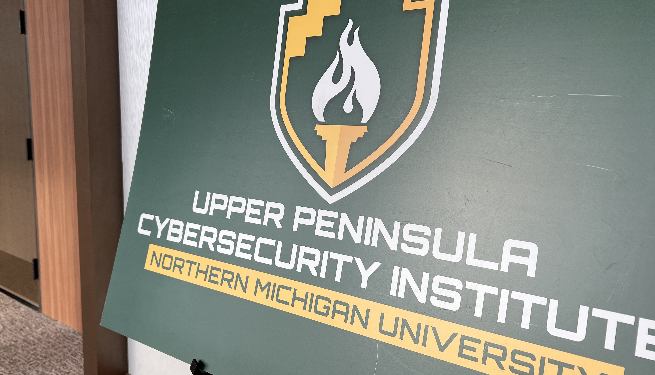MARQUETTE, Mich. (WZMQ) – As technology advances, online criminal activity has seen a recent spike as well. On Northern Michigan University’s campus is the 3-day summit called the “U.P. Cybersecurity Symposium”, aiming to better educate the real dangers of facing online threats.
Over 150 cybersecurity leaders from across the nation are on NMU’s campus for the summit, giving the community and other officials in the industry a better grasp of what online threats are out there.
Leaders introduced Northern Michigan University as a recognized center of academic excellence by the NSA and commented that with the ever-changing field of security, users need to be well educated and threats need to be exposed. “We’re discussing current threats threat actors incident response talking best practices…you know having that hard talk not following any link if you’re posting something online knowing that if it’s not friends and family it could end up anywhere,” commented the Director of the U.P. Cybersecurity Institute, Michael Sauer.
The UP Cybersecurity Institute says one of the larger concerns is addressing online use for children. According to a study done at Standford Medicine, about 25% of children received phones by age 10, and 75% by age 12, making online threats more accessible. “So we’re having K-12 curriculum designed around cyber security, we need to be having that education and we need to be having that discussions in K-12 schools,” continued Sauer.
Greg Sieg, who is the president of the Michigan Healthcare Cyber Security Council commented that even though AI is a growing field of technology, practicing what’s called cyber hygiene, can help keep users educated in keeping their information safe. “Every year something new comes up that we have to figure out how to handle that threat right now it’s artificial intelligence next year it’s gonna be something different, in the future, it’s gonna be quantum,” said Sieg. Sieg mentioned phishing, which is a form of cyber attack in which those sending the email pose as a reputable source in order to find or use personal information.
“Social engineering, vishing, other types of attack factors, those are still going to be your main areas, artificial intelligence is playing a role in that because they are able to build messaging that looks much more real than we’ve seen in the past,” continued Sieg.
Leaders noted that at the end of the day, making sure you have strong passwords and being actively aware of the links you click on are still ways to keep information safe.
Another cybersecurity summit called “Be Cyber Smart” will be held on October 18th, aiming to educate students on the dangers as well.
Click here, if you’d like more information on the 3-day Cybersecurity Summit.










